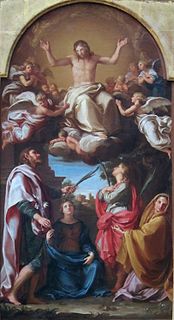Related Research Articles

Anazarbus was an ancient Cilician city. Under the late Roman Empire, it was the capital of Cilicia Secunda. Roman emperor Justin I rebuilt the city in 527 after a strong earthquake hit it. It was destroyed in 1374 by the forces of Mamluk Empire, after their conquest of Armenia.

Agathaof Sicily is a Christian saint. Her memorial is on February 5th. Agatha was born in Catania or Palermo, Sicily, and she was martyred c. 251. She is one of several virgin martyrs who are commemorated by name in the Canon of the Mass.

Oct. 31 - Eastern Orthodox liturgical calendar - Nov. 2

Saint Alexandra of Rome (Αλεξάνδρα) — Christian martyr and saint, known from "Martyrdom of Saint George" as either Emperor Diocletian's wife or the wife of Dacian, a Roman Prefect. She is also sometimes mistaken with Priscilla or Prisca.

Eulalia of Mérida was a young Roman Christian martyred in Augusta Emerita, the capital of Lusitania, during the Persecution of Christians under Diocletian. Other views place her death at the time of Trajan Decius. There is debate whether Saint Eulalia of Barcelona, whose story is similar, is the same person. Up till the proclamation of James, son of Zebedee, Eulalia was invoked as the protector of Christian troops in the Reconquista and was patron of the territories of Spain during their formation.

Saint Blandina was a Christian martyr who died in Lyon, France during the reign of Emperor Marcus Aurelius.

January 17 - Eastern Orthodox liturgical calendar - January 19

February 4 - Eastern Orthodox liturgical calendar - February 6

Andronicus, Probus (Provos), and Tarachus were martyrs of the Diocletian persecution. According to tradition, Tarachus was beaten with stones. Probus was thrashed with whips, his feet were burned with red hot irons, his back and sides were pierced with heated spits; finally he also was cut up with knives. Andronicus was also cut to pieces with knives.

Julian and Basilissa were husband and wife, and are venerated as saints in the Roman Catholic Church and the Eastern Orthodox Church. They were Christian martyrs who died at either Antioch or, more probably, at Antinoe, in the reign of Diocletian, early in the fourth century, on 6 January, according to the Roman Martyrology, or 8 January, according to the Greek Menaea.

Julian of Antioch, variously distinguished as Julian the Martyr,Julian of Antioch,Julian of Tarsus,Julian of Cilicia, and Julian of Anazarbus, was a 4th-century Christian martyr and saint. He is sometimes confused with the St Julian who was martyred with his wife Basilissa.
Elias and four companions, Daniel, Isaiah, Jeremiah, and Samuel were Egyptian martyrs. Their feast day is February 16.

Saints Victor and Corona are two Christian martyrs. Victor was a Roman soldier who was tortured and killed; Corona was killed for comforting him. Corona is venerated in connection with treasure-hunting and, since 2020, with the 2020 coronavirus pandemic.

Holy Unmercenaries is an epithet applied to a number of Christian saints who did not accept payment for good deeds. These include healers or Christian physicians who, in conspicuous opposition to medical practice of the day, tended to the sick free of charge. It may refer to:

Saint Boniface of Tarsus was, according to legend, executed for being a Christian in the year 307 at Tarsus, where he had gone from Rome in order to bring back to his mistress Aglaida relics of the martyrs.

Saint Domnina is venerated as a Christian martyr by the Roman Catholic and Eastern Orthodox Churches. According to tradition, she was a native of Cilicia who was imprisoned at Anazarbus and repeatedly beaten on the order of the Roman prefect Lysias. She was then burned with fire. She died in prison.

Christina of Bolsena, also known as Christina of Tyre, or in the Eastern Orthodox Church as Christina the Great Martyr, is venerated as a Christian martyr of the 3rd century. Archaeological excavations of an underground cemetery constructed at her tomb have shown that she was venerated at Bolsena by the fourth century.

The woman with seven sons was a Jewish martyr described in 2 Maccabees 7 and other sources. Although unnamed in 2 Maccabees, she is known variously as Hannah, Miriam, and Solomonia.

October 11 – Eastern Orthodox liturgical calendar – October 13

March 15 - Eastern Orthodox liturgical calendar - March 17